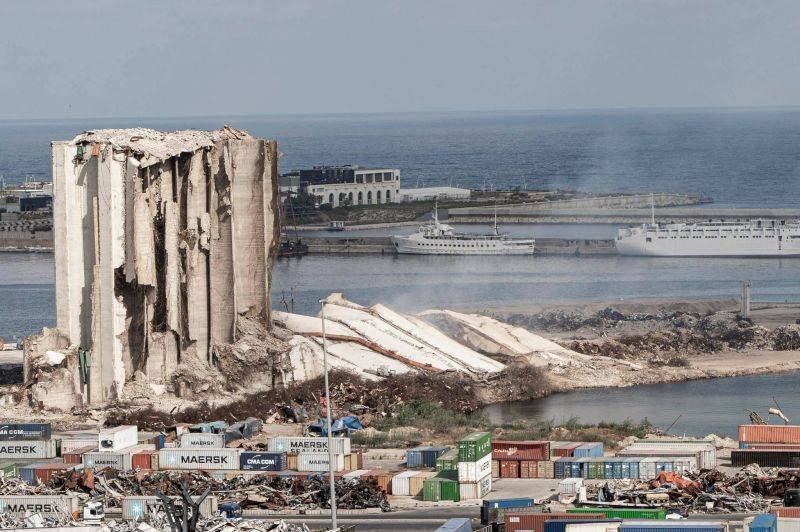
The silos of the port of Beirut after another collapse, Aug. 23, 2022. (Credit: Mohammed Yassine)
Want to get the Morning Brief by email? Click here to sign up.
"Could the banks have opposed the financial and monetary policies decided by the state and Banque du Liban?" the Association of Banks in Lebanon said yesterday, in a statement seeking absolution for the restrictions on depositors’ accounts after a series of holdups across Lebanon the same day. Depositors attempted to forcibly withdraw their funds from the Lebanese Bank for Commerce (BLC) in Chtaura, in the Bekaa; First National Bank (FNB) in Tripoli, North Lebanon; Intercontinental Bank of Lebanon (IBL) in Hazmieh, in the suburbs of Beirut; and Byblos Bank in Sour — only the first and last leading to successful withdrawals. The Internal Security Forces arrested several perpetrators after the incidents, including BLC assailant and reported ISF veteran Ali Sahili. A member of the lawyers’ collective Mouttahidoun went to the police station in Chtaura to defend Sahili. The bank later announced it would not press charges against the depositor and would transfer $4,300 to Sahili’s son who is studying abroad. The holdup was motivated, according to depositors’ groups, by the younger Sahili’s expulsion from university and eviction from his apartment due to unsettled bills. Mouttahidoun had coordinated previous bank hold-ups — notably Sali Hafez’s forcible withdrawal from Blom Bank in Beirut which, within 48 hours, sparked a series of similar incidents — and on Monday warned that “depositors’ actions” against banks would occur yesterday. Meanwhile, Electricity of Qadisha employees briefly protested deductions to their salaries inside a Tripoli branch of FNB. ABL responded to the incidents in a statement blaming authorities, notably the BDL, for commandeering and squandering banks’ foreign currency assets without implementing legal measures to counteract the crisis, namely capital controls.
Firefighters “will spray [fungicides] in the next two days, which will allow [them] to continue [cooling] operations” at the Beirut port silos, Beirut Fire Brigade commander Maher al-Ajouz, told L’Orient Today. The northern bloc of the silos, which were heavily damaged during the Aug. 4, 2020 port blast, completely collapsed in August after being engulfed in flames throughout July. This came after a March cabinet approval to demolish the silos, which was then revoked by Prime Minister Najib Mikati after the collapse of the northern silos. The Environment Ministry announced the start of cooling operations on Aug. 26, aiming in the first phase to reduce the temperature of leftover grains which had reportedly reached up to 450 degrees Celsius. Ajouz said the Environment Ministry "ordered the firefighters to stop their [cooling] operations" after the detection of potentially health-threatening fungi in the air. Authorities blamed the fires on a combination of summer heat and structural damage to the silos caused by the blast causing water seepage and consequently grain fermentation. The next cooling phase, Ajouz said, involves removing what had been the silo’s contents followed by a final phase attempting “the total extinction of the fire.” The stable southern bloc of the silos will be preserved as a national monument, scrapping previous plans for their demolition. The port blast victims’ relatives had said they would refuse any demolition before the end of the investigation, which remains stalled pending judicial assignments enabling rulings on complaints against lead investigator Judge Tarek Bitar. The blast killed over 200 people, wounded thousands and ravaged entire neighborhoods.
“It is not possible to appoint a substitute judge," the Beirut Bar Association said Tuesday, rejecting the Higher Judicial Council’s decision to add a magistrate to rule on detainees held in connection to the Aug. 4, 2020 Beirut port blast investigation, while blast victims’ relatives held their monthly vigil outside the port. Delays in judicial assignments have prevented rulings on complaints against lead investigator Judge Tarek Bitar, suspending the probe. Victims’ families expressed their support for Bitar during the memorial, dubbing him “The bold and impartial judge.” MPs Ghazi Zeaiter, Ali Hassan Khalil and former Public Works Minister Youssef Fenianos have repeatedly filed injunctions against Bitar since he named them as suspects in the investigation with warrants for their arrest. The Court of Cassation’s plenary assembly, authorized to rule on the complaints against Bitar, lost quorum on Jan. 12, 2022, while a draft to appoint additional members is seemingly being blocked by caretaker Finance Minister Youssef Khalil. Around 15 people remain in custody in connection to the blast, without trial. Detainees’ families, after repeatedly protesting for their relatives’ release, held sit-ins supporting the Higher Judicial Council’s appointment. The appointment of a judge to rule on detainees, while maintaining Bitar as lead investigator, has been heralded by some as expediting the course of justice and dismissed by others as a politically-targeted attempt to bypass justice, primarily through the release of FPM-affiliated Customs Director Badri Daher.
US Ambassador to Lebanon Dorothy Shea on Tuesday called for a resolution to the maritime border dispute between Lebanon and Israel “as soon as possible,” while Lebanese officials reportedly attempted to remove ambiguities from US mediator Amos Hochstein’s written proposal on border demarcation. “If Lebanon’s comments are taken into consideration, it would be a matter of days, not weeks, to sign the agreement,” Deputy Parliament Speaker Elias Bou Saab said on Monday, after having previously claimed Lebanon will not make fundamental modifications to the proposal. The written text is the result of drawn-out indirect negotiations between Lebanon and Israel mediated by US envoy Amos Hochstein. Shea on Saturday delivered Hochstein’s proposal, which on Monday was reviewed by President Michel Aoun, caretaker Prime Minister Najib Mikati Nabih Berri and Parliament Speaker Nabih Berri. Anonymous sources involved in the negotiations told L’Orient Today that Lebanon will attempt to introduce into the proposal safeguards against Israel annulling the agreement, claiming additional waters within its borders or potentially profiting from or intervening in Lebanese gas excavation.
In case you missed it, here's our must-read story from yesterday: “A temporary respite? TV set transforms Beirut neighborhood into downtown Alexandria”
Compiled by Abbas Mahfouz